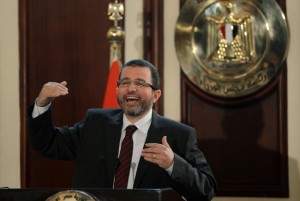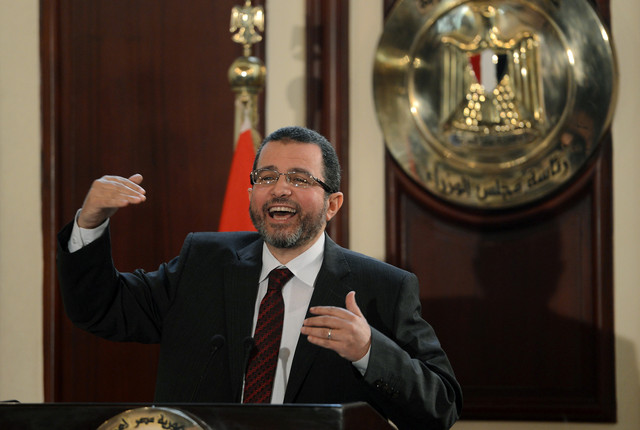
(AFP File Photo)
The Ministry of Finance will host a first-of-its-kind public auction on 26 June, built around the sale of gifts received by government officials worth $100 or more, proceeds of which will go to the treasury.
Prime Minister Hesham Qandil, along with members of current and previous governments, will be selling a total of 42 luxury and ordinary gifts received since July 2012 from various Arab and international officials, Minister of Finance Fayyad Abdel Moneim stated in a press release.
Abdel Moneim emphasised that this initiative follows a decision made by Qandil that officials and ministers keep no gifts valued at $100 or more. If such gifts are received, they are to be immediately sold off by the Ministry of Finance.
“According to Qandil’s decree, the revenues [from these gifts] will return to Egypt’s public coffers as a way to promote ‘transparency and accountability’ principles and to safeguard public funds, believing that this money is given to the whole nation, not to an individual,” Abdel Moniem was quoted as saying in the press release. He added that the ministry has appointed senior experts and appraisers to value these gifts.
According to the press release, the gifts include Cartier, Omega and Rado luxury watches, pure-silver plates, silk carpets, vases, pens, and some electronic devices. The ministry is also providing a catalogue containing all information and pictures of the gifts which are also to be displayed on the ministry’s website.
The auction is open to the public and there is currently no estimate of the expected returns, said Mohamed El-Saqa, Finance Ministry spokesperson.
Officials who have received gifts include Qandil, the Grand Imam of Al-Azhar Ahmed El-Tayeb, ministers of parliamentary affairs, media, industry, investment, telecommunication, higher education, oil and mineral resources, and others.
Qandil has returned 13 gifts, the minister of telecommunication has returned 7, and minister of information has returned three.
Economic expert Sherif El-Kheriby dismissed the move, calling it a “gesture only [meant] to attract media attention, no more.”
He added that it was by no means a novel initiative, and had been adopted in many countries, qualifying however, that “[elsewhere], ministers keep the gifts until they resign, then they offer them to the public treasury.”
El-Kheriby said that he preferred those gifts be displayed in a museum rather than sold at auction “especially since we don’t know who will be the auction’s watchdog.”
El-Kheriby also believes that the government announced this decree now as an attempt to placate the public ahead of mass protests slated for 30 June.
Gimmick or not, the government has no lack of reasons to be on the lookout for new sources of internal funding.
Egypt’s economy has been on the decline since the 2011 uprising as ongoing political upheavals and uncertainty have slowed growth and depleted international currency reserves. The cash-strapped government, which is in talks with the International Monetary Fund to secure a much-needed $4.8bn loan, is also grappling with the Middle East’s biggest budget deficit, which is expected to soar to EGP 197.5bn this fiscal year.




